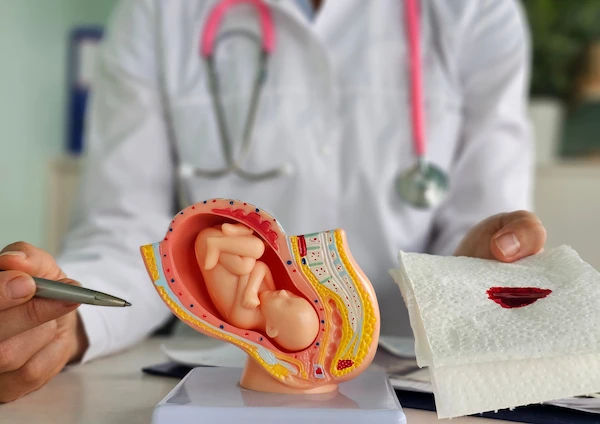Pregnancy Test and its Accuracy
Learn about pregnancy tests and their accuracy. Discover how they work, factors affecting results, and tips for ensuring reliable outcomes. Get all the details.

Written by Dr Shreya Sarkar
Last updated on 3rd Jul, 2025
Pregnancy Tests deduce the presence of pregnancy in women. The primary method is the identification of Human Chorionic Gonadotropin (HCG) in the urine or blood of the women. Pregnancy tests, especially at-home kits, are important as they offer timely and reliable results. They help individuals prepare and opt for regular check-ups to ensure a seamless pregnancy and a healthy child. Therefore, understanding how these tests work and the factors that determine their accuracy will aid individuals in making informed decisions.
Types of Pregnancy Tests
The pregnancy tests are of two types:
1. Home-Based Pregnancy Test
In home-based pregnancy tests, women can use over-the-counter pregnancy kits to check their condition at home. They have to put their urine on a stick, which changes colour when they have high HCG levels. While the procedure is the same for all the tests, the results of different brands may appear differently depending on the sensitivity of the kit.
2. Clinic Based Pregnancy Test
Here, the patient takes a blood test, and the doctor confirms her pregnancy from the HCG levels. This test confirms a pregnancy without fail.
How Accurate Are Home Pregnancy Tests?
There are many factors that affect the accuracy of at-home pregnancy tests, and these parameters should be kept in mind when opting for them. Here are the details –
- Time When the Test Is Being Taken: This test should be taken only after a woman misses her period. If taken before, results may be inaccurate.
- Time to Check the Levels: A pregnancy test is the first thing that should be done in the morning to make it easier to detect HCG levels and for better accuracy.
- How to carry out the Process: Every home test kit has different ways to test, so it is imperative to read the steps before the test is done and then executed.
- Proper diet: Drinking a lot of liquid or even water can dilute HCG levels, so it should be kept in mind. The test should be done early in the morning. Food containing Antihistamines should also be avoided.
- Period Cycle: Sometimes irregular periods might confuse the patient, so a tracker should be maintained for the cycle for more accurate results.
- Kit Quality: The kit should be checked for expiration date before use to get the best outcome.
Medical Condition: If a patient has just had a miscarriage or an abortion, the result might be positive, which should be kept in mind.
Factors Influencing Pregnancy Test
Certain steps should be followed while doing the test so that the results are accurate. These are:
1. Test Sensitivity
Different tests have different sensitivity, which helps in efficiently testing the HCG levels in a patient. Some home kits are highly sensitive, and as a result, HCG levels as low as 25mlU/ml can be identified. Some other kits have high sensitivity and can determine HCG as high as 1500 to 2000mlU/ml with accurate results.
2. Test Timing
Periods are missed after fourteen days of conception of the embryo; hence, it is important that the tests are done after a woman misses her period. In this way, the test results will be accurate.
3. User Error
Some precautions should be taken by the user while testing urine using the at-home kits. The instructions in the kit should be read thoroughly, and the test should be carried out. Simple steps like –
- Testing when the periods are missed and not before time
- Using the first urine in the morning for the test
- Providing the right amount of urine
- Performing the test on time
False Positives and Negatives
The reasons for a false positive –
- Ectopic Pregnancy
- Ovarian cysts
- Chemical pregnancy, where the pregnancy ends after a short while of getting lined to the uterus
- Menopause
Some reasons for a false negative test are –
- The individual is using specific medication like tranquilisers and anticonvulsants
- The test is not taken from the first urine in the morning
- Taking the test right after missing the period and not giving it enough time
- Not waiting enough time after taking the test
When to Take a Pregnancy Test?
When a woman suspects her pregnancy, she must wait a week from the time she misses her period. If the test is done earlier, the results may be inaccurate. But even if the test is not taken on time, she will be able to detect her pregnancy herself.
Some signs that denote that a test should be taken care of –
- Fatigue: High progesterone levels during pregnancy make the woman feel tired throughout the day.
- Needing to throw up without vomiting: This is a classic symptom and is also known as morning sickness in pregnant women. So, individuals can easily identify their condition from this symptom.
- Frequent urination: During pregnancy, the amount of blood in the body increases, which causes the kidneys to process more fluid, leading the women to urinate more often than usual.
- Swollen breasts: Hormonal changes make the breast sore and tender during early pregnancy, which is another indication of pregnancy.
Confirming Pregnancy Test Results
If the home test results are positive, the person must make an appointment with a doctor. They will need a blood test or an ultrasonography to confirm their pregnancy. As soon as the confirmation comes, gestational prenatal care can begin.
Simultaneously, for negative results with persisting symptoms, the doctors conduct additional quantitative blood HCG to measure the exact hormone levels. It helps them investigate underlying factors to confirm or deny the pregnancy.
Impact of Medical Conditions and Medicines
There are certain medications that raise a person’s hormone levels in the blood and urine. For instance, some weight loss medicines contain synthetic HCG, causing false alarms. Some other drugs that may cause false positives are –
- Aspirin
- Carbamazepine
- Methadone
Some medical conditions that cause the HCG levels to rise are –
- Gestational trophoblastic diseases like molar pregnancy
- Pituitary gland disorders and hormonal disbalances
- Cancer (ovarian, bladder, kidney, liver, lung, colon, breast and stomach)
- Phantom HCG
- Ovarian cysts which produce HCG
- Kidney diseases or urinary tract disorders
Advances in Pregnancy Test Technology
Some advancements have happened in pregnancy tests, such as home kits being digitalised. They offer early detection even before a woman misses her period so that she can be careful and remain cautious of any hindrance to motherhood.
Some future trends in the Pregnancy test would be:
- Early detection kits
- Non-invasive methods for prenatal care
- Remote monitoring through advanced mechanisms
- Private tests done at home
- Improved and efficient data management
Conclusion
Pregnancy tests inspect the HCG levels in the blood or urine to decide if a woman is expecting a baby. There are home test kits that she can use that offer precious results most of the time. Otherwise, she can always opt for a blood test to get confirmation. While false positives and negatives are a reality, clinical tests clear up every confusion. After a positive response, women need to visit a doctor, get a thorough evaluation, and start prenatal care as soon as possible.
Consult Top Gynaecologist
Consult Top Gynaecologist

Dr. Vidya Konduri
Obstetrician and Gynaecologist
9 Years • MS
Chinagadila
Apollo Hospitals Health City Unit, Chinagadila
(25+ Patients)

Dr. Swetha P
Obstetrician and Gynaecologist
11 Years • MBBS, MS(OBGY)
Hyderabad
Apollo Hospitals Jubilee Hills, Hyderabad
(50+ Patients)

Dr. Ruplin Terangpi
Obstetrician and Gynaecologist
11 Years • MBBS, MS (OBS & GYNAEC)
Mumbai
Apollo Hospitals CBD Belapur, Mumbai

Dr. Rashmi Sharma
Obstetrician and Gynaecologist
27 Years • MBBS, MD - Obstetrics & Gynaecology, MRCOG(UK), DMRD, FRCOG.
Bilaspur
Apollo Hospitals Seepat Road, Bilaspur
(250+ Patients)

Dr. Swati Shah
Surgical Oncologist
15 Years • DNB Surgical Oncology, certified Robotic Cancer Surgeon
Ahmedabad
Apollo Hospitals Gandhinagar, Ahmedabad
(25+ Patients)




